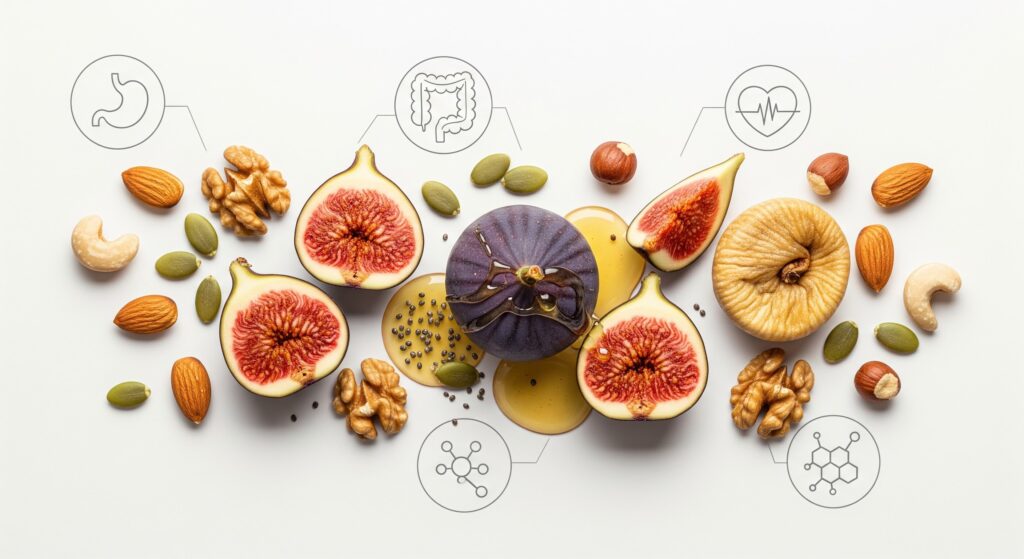With all the daily distractions, it’s almost second nature to reach for pre-packaged snacks and sugary treats. They provide a jolt of quick energy, and not much more. Nature, however, provides its own sweets that are both indulgent and nourishing. One of the most remarkable among these is anjeer, also known as dried figs. Valued for centuries in Indian homes and Ayurveda, anjeer offers a rare combination of taste, texture, and concentrated nutrition.
With its subtle sweetness and chewy bite, anjeer has been admired not just for flavour but also for the myriad health benefits it provides. Integrating this ancient fruit into daily diets can be both pleasurable and beneficial.
What Is Anjeer (Dried Fig)?
Anjeer is the dry fruit of the fig tree, or Ficus carica. Fresh figs are ripe, juicy, and sweet and when dried, they turn intense and chewy with miniscule edible seeds that contain condensed natural sugars and nutrients.
Historically, figs have been revered not only in Indian culture but also in Mediterranean and Middle Eastern traditions. In Ayurveda, they are considered healing foods, useful for improving digestion, supporting energy, and strengthening bones. Today, anjeer continues to be a key ingredient in Indian festive sweets, traditional desserts, and even modern health snacks, making it a fruit that has endured across generations and cultures.
Nutritional Profile of Anjeer
Anjeer is far from an ordinary sweet. A small serving contains a well-balanced mix of energy, minerals, fibre, and antioxidants that support overall wellness. Unlike other processed snacks, dried figs give you all-natural sugars and key nutrients that help your body work right.
Key nutrients per 100 grams of dried figs approximately include:
- Calories: 249 kcal, providing long-lasting energy
- Carbohydrates: 63g, from natural fruit sugars
- Protein: 3.3g, contributing plant-based protein
- Fat: 0.9g, very low and heart-friendly
- Dietary Fiber: 9.8g, aiding digestion and supporting sugar balance
- Calcium: 162 mg, for strong bones
- Iron: 2 mg, supporting haemoglobin levels
- Magnesium: 68 mg, essential for muscles and nerves
- Potassium: 680 mg, maintaining healthy blood pressure
- Antioxidants: polyphenols and flavonoids protecting cells from damage
Even just two to three figs a day can provide significant health benefits.
Health Benefits of Anjeer

The appeal of anjeer lies in its versatility. Whether it is enhancing digestion, boosting energy, or supporting skin health, this fruit offers multiple advantages.
- Supports Digestion
The high fibre content acts as a natural laxative, promoting regular bowel movements and preventing constipation. Soaking figs overnight can make them easier to digest, especially for sensitive stomachs. - Promotes Heart Health
Loaded with potassium and magnesium, anjeer controls sodium level in the body, thus helps control blood pressure. Soluble fibre also combines with extra cholesterol in the gut, which can help prevent heart disease. - Strengthens Bones and Joints
Anjeer is among the best sources of calcium and magnesium in a plant-based food. It promotes strong bones and supports joint health, doubly useful in post-menopausal women, growing children, and mature adults. - Provides Natural Energy
containing natural glucose and fructose, Figs provide a quick, energy boost that remains stable, without the blood sugar spikes evident with processed sugar. This is a product that students, athletes, and anyone else needing stable energy would be able to take advantage of. - Supports Reproductive and Hormonal Health
Traditionally seen as an aphrodisiac, anjeer contains zinc, magnesium, and iron, which help maintain hormonal balance, stamina, and reproductive health. Women can also find relief from menstrual fatigue through its iron content. - Helps Manage Weight and Blood Sugar
With their low glycaemic index and a generous fibre content, figs provide a feeling of fullness and help to brake hunger while giving you a lot of nutrition and not much sugar. When eaten in moderation, this makes them a good choice for people watching their weight, and people with diabetes. - Enhances Skin Health and Anti-Aging
Antioxidants in figs fight off free radical damage, feed cells and contribute to healthy, young-looking skin. They can be enjoyed in the diet or even incorporated into natural face treatments.
How to Include Anjeer in Your Diet
Anjeer can be incorporated in multiple delicious and practical ways:
- Soaked Overnight: Easier digestion and softer texture
- Morning Snack: Two to three figs with almonds or walnuts provide a nutritious start
- Smoothies and Milkshakes: Blended with milk or plant-based milk for a creamy, naturally sweet drink
- Desserts: Replace refined sugar in recipes like Kaju Anjeer Barfi for a healthier twist
- Toppings: Chop and sprinkle on oatmeal, yogurt, or salads for extra nutrition
- Sweets: Try OMSWEETS Kaju Anjeer Barfi, the exotic blend of Cashew & Anjeer makes for an irresistible sweet treat and a great addition to any occasion.
Who Should Include Anjeer in Their Diet?
Anjeer benefits people of almost all ages and lifestyles:
- Vegetarians and Vegans: Non-dairy source of calcium and iron
- Women: Supports bone density, skin, and menstrual health
- Men: Boosts stamina, vitality, and cardiovascular wellness
- Athletes and Students: Sustained energy and recovery support
- Elderly: Easier digestion and stronger bones
- Weight-Conscious or Diabetic Individuals: Smarter sweet option when consumed in moderation
Conclusion
Anjeer has maintained its status as a naturally sweet, nutrient-dense fruit for centuries. Its benefits span from improving digestion and providing steady energy to supporting heart health, bones, and skin. Incorporating anjeer into traditional Indian treats or as a daily snack provides a way to enjoy sweetness without compromising on health.
This small, chewy fruit exemplifies how natural foods can satisfy both taste and wellness. Regular consumption can lead to visible improvements in energy, digestion, and overall vitality.
FAQs
- How many dried figs should I eat daily?
Two to three figs are ideal for most adults. Active individuals may consume slightly more. - Should I soak anjeer before eating?
Yes, soaking helps improve digestibility, especially for sensitive stomachs. - Is anjeer suitable for diabetics?
Yes, when eaten in moderation, it provides a slow, steady energy release without sharp sugar spikes. - Can figs help with constipation?
Yes, their high fibre content makes them an effective natural remedy. - What is the difference between fresh figs and dried anjeer?
Fresh figs are juicy and less calorie-dense. Dried figs have concentrated nutrients and natural sugars. - Is it safe to eat figs every day?
Yes, daily consumption of two to four figs is safe and beneficial.

